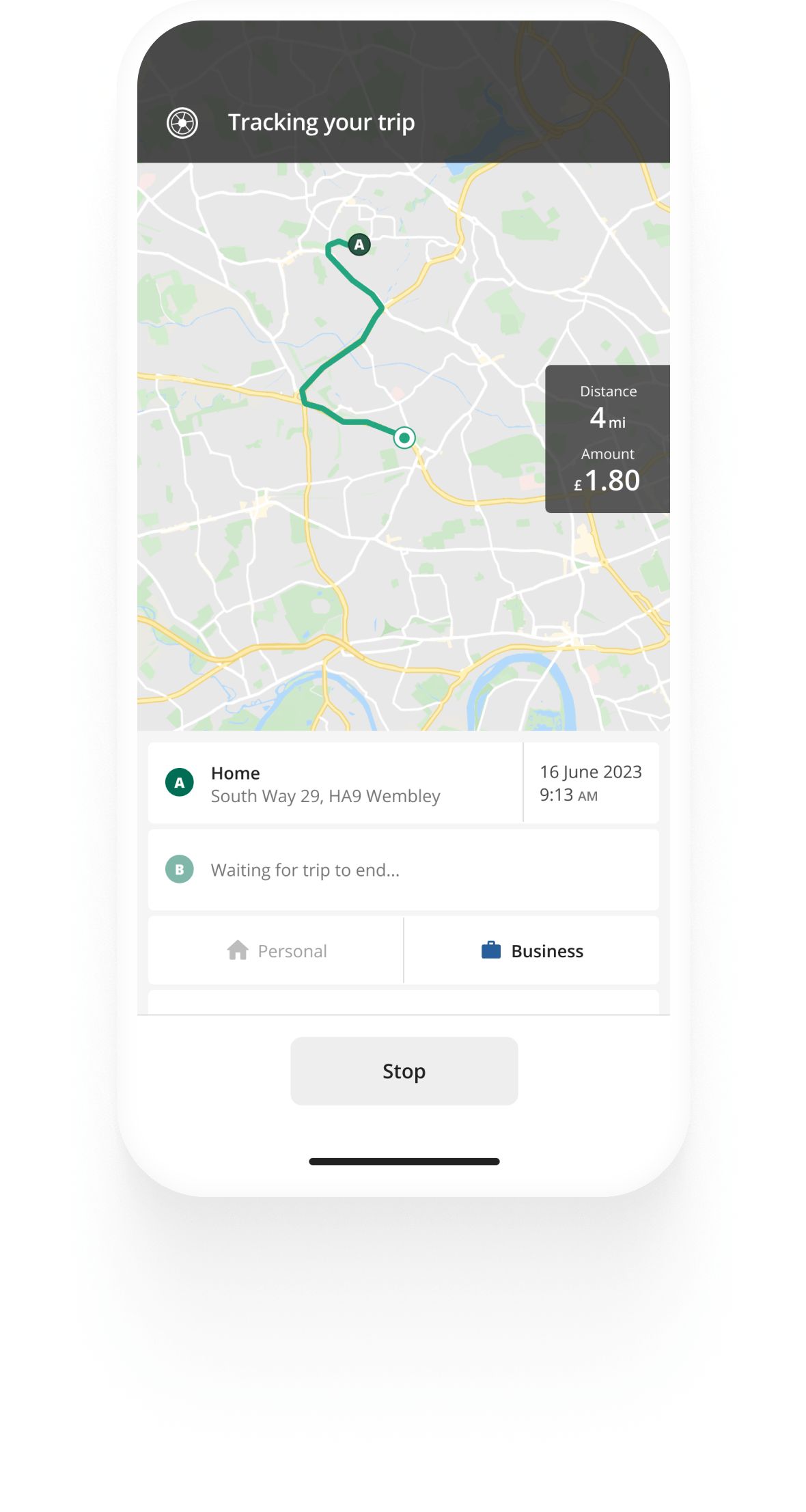Track mileage automatically
Get started.svg)
HMRC mileage claim in the UK
If you use a car, van, motorcycle or bicycle for business purposes, you may be able to claim mileage through your taxes. You should be able to file a mileage claim on the approved allowance rate if you use your own vehicle(s) for work. The mileage claim covers the expenses of owning and operating your vehicle. This article will provide you with a brief overview of HMRC mileage claims in the UK and which expenses you can get reimbursed.
What qualifies for my mileage claim?
First, you need to understand what HMRC classifies as business mileage since that is the only mileage you can deduct through your mileage claim. Business mileage is generally defined as driving to places other than your usual workplace for business purposes.
Different rules may apply in different situations, so it's always a good idea to double-check your eligibility before filing a claim. If the time spent at a temporary place of work exceeds 24 months, a claim may still be made in some cases. Generally, a place only counts as temporary if the time spent there is less than 24 months. Here are a few examples of trips you can include in your mileage claim:
- Picking up supplies for business
- Attending conferences
- Meeting clients
- Making home visits for work


Mileage tracking made easy
Trusted by millions of drivers
Automate your mileage log Automate your mileage log

Automatic mileage tracking and HMRC-compliant reporting.
Get started for free Get started for freeHow much mileage can I claim from HMRC?
Your HMRC mileage claim amount depends on a couple of things. The first one is what vehicle you drive as there are different HMRC standard rates for different vehicles - see the 2025/26 mileage rates. The second factor to consider is whether you are calculating your mileage claim for up to 10,000 miles or more as the rates change after that threshold.
To calculate how much mileage you can claim, you can try using our HMRC mileage claim calculator.
There is no limit to the miles you can claim, so long as they are business-related.
How do I make a mileage claim?
To claim your mileage, you need to have accurate records of the miles you have driven with any vehicle that you use for business purposes (even if you combine the use with private purposes).
You can usually do this by keeping track of your trips in a mileage logbook. Nowadays, you can easily do this by using a mileage tracking app. A good mileage logging app will make sure that you have all the information you need for your HMRC mileage claim. Apps such as Driversnote are HMRC-compliant, automatic mileage trackers - meaning you can use the tracked trips to prove you have travelled the miles for business purposes.
How far back can I make a mileage claim in the UK?
Good news! You can claim mileage for as far back as the last four tax years, according to HMRC rules. So if you forgot any trips in the previous years and you have the records - you can claim the miles.
What records should I keep for my HMRC mileage claim?
To submit your mileage claim, there are certain records you must log in your mileage logbook and certain receipts. First, you need to make sure you have all the trips in your logbook with the proper date, distance, reason for the trip, and start and end address written down.
If you have been using public transport for business purposes, you can also claim mileage for your trips. Make sure to keep all receipts and tickets any time you take the train, bus, metro, etc. for your work-related trips.
HMRC mileage claim for self-employed
Self-employed individuals should multiply the number of miles driven for business by the standard HMRC rate and make a mileage claim based on the total. If you don't use flat rates, you'll need to make a claim based on the total cost of the car's purchase and operation, such as fuel and insurance. Read more about claiming mileage as self-employed.
What is the easiest way to claim mileage in the UK?
We get it, it may seem a bit tricky to figure out all the Dos and Don'ts about mileage claims in the UK. The easiest thing you can do is make sure that you have all the right records and information, to begin with. Consult with HMRC's website for the exact rules depending on your situation and take a look at our guide to HMRC mileage rates and mileage caim in the UK.
If you have proper records about your mileage throughout the year, you will be easily able to file your claim through Self Assessment or tax form P87.
The easiest way to make sure the records of your trips are kept safe is by using a mileage tracking app. Alternatively, you can try a physical logbook, a Spreadsheet or a PDF.

Tired of logging mileage by hand?
Effortless. HMRC-compliant. Liberating.
Top posts
- HMRC advisory fuel rates 2025
- Automate mileage tracking in healthcare with Driversnote Teams UK
- Driversnote Teams vs MileIQ for teams
Related posts
Free mileage log book template
Latest update: 7 May 2025 - 2 min read
Whether you're an employee or a business owner, it's crucial to keep good mileage records in a mileage log book.
HMRC Mileage Guide
Latest update: 2 April 2025 - 5 min read
Welcome to our guide on mileage claims and reimbursement in the UK. This guide will walk you through the rules that apply to your situation.
HMRC advisory fuel rates 2025
Latest update: 5 December 2025 - 5 min read
HMRC has announced the revised advisory fuel rates, effective 1 December 2025. See how they apply to employees and employers.
.svg)

